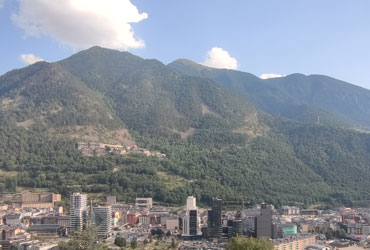Andorra is one of the smallest states in Europe and the only country in the world with a parliamentary co-principality. But these are not the only peculiarities of the Principality. Its small size, its geographical enclave, its political tradition and other historical factors have given Andorra a special relationship with the European Union.
Table of contents
- Before and after 1990
Customs Union Agreement and TEC (Common External Tariff)
Customs Union and Consumption Tax Agreement
Customs Union Agreement and travellers’ duty-free allowances
Towards an Association Agreement with the EU
Before and after 1990
The changes in the European macroeconomic environment led Andorra to consider the need to move closer to the European Union and to re-think its relations with the new economic area that was being built around it. This need was reinforced when Spain joined the then EEC (European Economic Community), now the EU (European Union), in 1986.
Until 1990, when the customs union agreement between Andorra and the EEC was signed, Andorra had bilateral agreements with the two countries with which it shared a border: Spain and France. The problem was that the provisions of these agreements were incompatible with the Treaty of Rome (which established the EEC) and Community requirements, as well as with GATT (General Agreement on Tariffs and Trade) rules.
Thus, following Spain’s entry into the EEC (France had been a founding member since 1957), it became imperative for Andorra to review its bilateral relations with France and Spain in order to integrate into the new international sphere that was being forged around it.
In this context, and after four years of pre-negotiations, the Customs Union Agreement was signed (1990). This trade agreement, which is still in force today, establishes a customs union for industrial products only. Although they remain outside the customs union, agricultural products are included in the customs union agreement, so agricultural products of Andorran origin are exempt from import duties in what is still the European Economic Community.
In short, the Customs Union Agreement involved the establishment of a partial customs union with the EEC (effective for industrial products and establishment of a third country in the case of agricultural products). It required Andorra to apply Community legislation on technical and sanitary aspects relating to trade in goods. It also involved an increase in tax exemptions on goods purchased in Andorra by private travellers returning to their country of residence by crossing the Spanish or French border.
In this way, Andorra has managed to integrate into the European sphere while maintaining its fiscal specificities and a negative differential with Spain and France.
Customs Union Agreement and TEC (Common External Tariff)
Under the 1990 Customs Union Agreement, Andorra applies the same tariffs and conditions as the rest of the European Union to imports of industrial products originating in countries outside the European Union.
The TEC (Common External Tariff) is a customs duty applicable to all countries of the European Union (and also to Andorra, thanks to the Customs Union Agreement) when importing goods from third countries into the European Union.
This tax is payable by companies importing products, as well as by individuals or travellers bringing industrial products into Andorra from a country outside the European Union. It applies to products 25 to 97 of the harmonised system and is paid when these products enter Andorra.
The duty to be paid is fixed by the European Union and depends on the product imported.
Customs Union and Consumption Tax Agreement
Agricultural products imported into Andorra (products 1 to 24 of the Harmonised System) are not covered by the 1990 Customs Union Agreement with the EU, but are still subject to customs duties, in the form of the Consumption Tax.
This is payable by individuals, companies and travellers importing agricultural products into Andorra. Payment is generally made on entry into the country.
As in the case of industrial products, the tax on agricultural products varies according to the product imported. The general rates are between 1% and 3%, with higher special rates for certain products such as alcoholic beverages, tobacco or the import of certain types of live animals.
The reduced rate (1%) applies to products in the food sector intended for human consumption (excluding alcoholic beverages) and also for animals. It also applies to imports of water for human consumption or irrigation, imports of live animals, plants or seeds, and imports of hybrid vehicles from the EU. Books, magazines and newspapers whose content is not primarily advertising are also taxed at the reduced rate of 1%.
The special rate (2.5%) applies to imports of works of art, collectors’ items and antiques (in accordance with the regulations and the general product nomenclature).
Medicines reimbursed by the Caixa Andorrana de Seguretat Social (Andorran Social Security Fund) are completely exempt.
All other imported goods are subject to the general rate of 4.5%. Vehicles imported from non-EU countries are subject to a 10% surcharge.
Customs Union Agreement and travellers’ duty-free allowances
One of the highlights of the customs union agreement between Andorra and the European Union was the extension of duty-free allowances for people visiting the country and returning to their EU countries of origin with goods purchased in the Principality.
At present, anyone crossing the Andorran border is allowed to carry the following products for personal use, without paying any tax or duty, in the amounts indicated. It is important to note that the value of the allowances cannot be cumulated, either between agricultural and industrial products, or between travellers. Furthermore, the value of a single item cannot be divided between several people, and if a person transports a “composite item” in a single means of transport, it is considered to be a single item, even if its component parts are included in different purchase invoices.
a) Customs duties for people over 17 years of age
Agricultural products:
Coffee: 1 kg or 400 g in the case of extracts (each category is exclusive)
Tea: 200 g or 80 g in the case of extracts (each category is exclusive)
Alcoholic beverages (each category is exclusive):
Up to 1.5 litres of beverages above 22º, or
Up to 3 litres of spirits or aperitifs below 22º, or
Up to 5 litres of table wine or sparkling wine
Tobacco (each category is exclusive):
Up to 300 cigarettes (1.5 cartons), or
Up to 150 cigars of less than 3 g each, or
Up to 75 cigars of more than 3 g each, or
Up to 400 g of pipe tobacco
All other agricultural products: Up to €300 but not exceeding the following amounts for these specific products:
Maximum 2.5 kg of powdered milk
Maximum 3 kg of condensed milk
Maximum 6 l of fresh milk
Maximum 1 kg of butter
Maximum 4 kg of cheese
Maximum 5 kg of confectionery and sugar
Maximum 5 kg of meat
Industrial products:
Perfumes: 75 g of perfumes and 375 ml of colognes
Other industrial products: Up to €900 per person.
b) Customs duties for children under 17 years of age
For children under the age of 17, these customs duties are slightly different and also depend on the age of the child. It should be noted that minors under the age of 17 are not entitled to allowances for alcoholic beverages or tobacco.
Agricultural products:
Coffee: 1 kg or 400 g for extracts (each category is exclusive)
Tea: 200 g or 80 g for extracts (each category is exclusive)
All other agricultural products: Up to €300 (or up to €150 in the case of children under the age of 15), without exceeding the following amounts for these specific products:
Maximum 2.5 kg of powdered milk
Maximum 3 kg of condensed milk
Maximum 6 litres of fresh milk
Maximum 1 kg of butter
Maximum 4 kg of cheese
Maximum 5 kg of confectionery and sugar
Maximum 5 kg of meat
Industrial products:
Perfumes: 75 g of perfumes and 375 ml of colognes
Other industrial products: Up to €900 per person (or up to €450 for children under 15).
Towards an Association Agreement with the EU
33 years after the signing of the Customs Union Agreement between Andorra and the then EEC, the Principality is negotiating an Association Agreement with the European Union to bring the EU and the Principality as close as possible.
The Customs Union Agreement laid the foundations for a trade agreement that is still in force today, opening up the country to Europe while successfully defending its economic specificities.
Over the last three decades, Andorra has gradually adapted its legislation to the requirements of the European environment. The country’s political will to move closer to Europe in other areas has been demonstrated by the signing of direct agreements with the EU, such as the aforementioned Customs Union Agreement (1990), but also other subsequent agreements, such as the
– Co-operation Agreement (2004)
– Agreement on the taxation of savings income (2004)
– Monetary agreement (2011)
– Agreement on the automatic exchange of fiscal information (2016).
To this we should add the launch of negotiations for a partnership agreement in 2015, which are still continuing.



